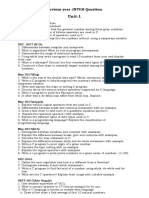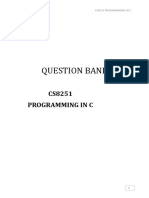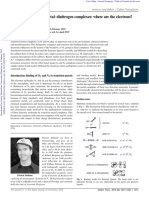Function With No Arguments and No Return Value
Uploaded by
harpriyaminhasFunction With No Arguments and No Return Value
Uploaded by
harpriyaminhasFor better understanding of arguments and return type in functions, user-defined functions can be
categorised as:
1. Function with no arguments and no return value
2. Function with no arguments and return value
3. Function with arguments but no return value
4. Function with arguments and return value.
Let's take an example to find whether a number is prime or not using above 4 categories of user
defined functions.
Function with no arguments and no return value.
/*C program to check whether a number entered by user is prime or not using
function with no arguments and no return value*/
#include <stdio.h>
void prime();
int main(){
prime(); //No argument is passed to prime().
return 0;
}
void prime(){
/* There is no return value to calling function main(). Hence, return type of prime()
is void */
int num,i,flag=0;
printf("Enter positive integer enter to check:\n");
scanf("%d",&num);
for(i=2;i<=num/2;++i){
if(num%i==0){
flag=1;
}
}
if (flag==1)
printf("%d is not prime",num);
else
printf("%d is prime",num);
}
Function prime() is used for asking user a input, check for whether it is prime of not and display it
accordingly. No argument is passed and returned form prime() function.
Function with no arguments but return value
/*C program to check whether a number entered by user is prime or not using
function with no arguments but having return value */
#include <stdio.h>
int input();
int main(){
int num,i,flag = 0;
num=input(); /* No argument is passed to input() */
for(i=2; i<=num/2; ++i){
if(num%i==0){
flag = 1;
break;
}
}
if(flag == 1)
printf("%d is not prime",num);
else
printf("%d is prime", num);
return 0;
}
int input(){ /* Integer value is returned from input() to calling function */
int n;
printf("Enter positive integer to check:\n");
scanf("%d",&n);
return n;
}
There is no argument passed to input() function But, the value of n is returned
from input() to main() function.
Function with arguments and no return value
/*Program to check whether a number entered by user is prime or not using function
with arguments and no return value */
#include <stdio.h>
void check_display(int n);
int main(){
int num;
printf("Enter positive enter to check:\n");
scanf("%d",&num);
check_display(num); /* Argument num is passed to function. */
return 0;
}
void check_display(int n){
/* There is no return value to calling function. Hence, return type of function is void.
*/
int i, flag = 0;
for(i=2; i<=n/2; ++i){
if(n%i==0){
flag = 1;
break;
}
}
if(flag == 1)
printf("%d is not prime",n);
else
printf("%d is prime", n);
}
Here, check_display() function is used for check whether it is prime or not and display it
accordingly. Here, argument is passed to user-defined function but, value is not returned from it to
calling function.
Function with argument and a return value
/* Program to check whether a number entered by user is prime or not using
function with argument and return value */
#include <stdio.h>
int check(int n);
int main(){
int num,num_check=0;
printf("Enter positive enter to check:\n");
scanf("%d",&num);
num_check=check(num); /* Argument num is passed to check() function. */
if(num_check==1)
printf("%d is not prime",num);
else
printf("%d is prime",num);
return 0;
}
int check(int n){
/* Integer value is returned from function check() */
int i;
for(i=2;i<=n/2;++i){
if(n%i==0)
return 1;
}
return 0;
}
Here, check() function is used for checking whether a number is prime or not. In this program, input
from user is passed to function check() and integer value is returned from it. If input the number is
prime, 0 is returned and if number is not prime, 1 is returned. A function that calls itself is known as
recursive function and this technique is known as recursion in C programming.
You might also like
- Data Base Management Systems - Lab 2ND SEM BCA - Y2K8 SCHEMENo ratings yetData Base Management Systems - Lab 2ND SEM BCA - Y2K8 SCHEME8 pages
- Defining A Structure: Title Author Subject Book IDNo ratings yetDefining A Structure: Title Author Subject Book ID5 pages
- CS3271 Programming in C Laboratory Manual 1No ratings yetCS3271 Programming in C Laboratory Manual 161 pages
- Computer Architecture: 1. Draw A Diagram Single Bus Organization of The Data Path Inside A ProcessorNo ratings yetComputer Architecture: 1. Draw A Diagram Single Bus Organization of The Data Path Inside A Processor8 pages
- BCA T 113 Digital Electronics Question BankNo ratings yetBCA T 113 Digital Electronics Question Bank9 pages
- Practical Number-8: Write A Program To Perform Insertion and Deletion in Single Linked ListNo ratings yetPractical Number-8: Write A Program To Perform Insertion and Deletion in Single Linked List7 pages
- Design and Analysis of Algorithms Laboratory 10CSL47No ratings yetDesign and Analysis of Algorithms Laboratory 10CSL4728 pages
- Unit-3 (Database Design and Normalization)No ratings yetUnit-3 (Database Design and Normalization)18 pages
- Anna University OOPS Question Bank Unit 2No ratings yetAnna University OOPS Question Bank Unit 26 pages
- Question Bank: Software Engineering and Project Management (BCS501)No ratings yetQuestion Bank: Software Engineering and Project Management (BCS501)1 page
- Types of User-Defined Functions in C ProgrammingNo ratings yetTypes of User-Defined Functions in C Programming6 pages
- Realization of High Thermoelectric Fig of Merit in GeTe by Complementary Co Doping of Bi and inNo ratings yetRealization of High Thermoelectric Fig of Merit in GeTe by Complementary Co Doping of Bi and in17 pages
- 2021 Joule (42) How To MeasureThermoelectricProperties ReliablyNo ratings yet2021 Joule (42) How To MeasureThermoelectricProperties Reliably6 pages
- Phase Boundary Mapping To Obtain N-Type Mg3Sb2 Based ThermoelectricsNo ratings yetPhase Boundary Mapping To Obtain N-Type Mg3Sb2 Based Thermoelectrics15 pages
- Metal Dinitrogen and Dioxygen Complexes PDFNo ratings yetMetal Dinitrogen and Dioxygen Complexes PDF11 pages
- Pyramidality and Metal-Metal Multiple Bonding: Structural Correlations and Theoretical StudyNo ratings yetPyramidality and Metal-Metal Multiple Bonding: Structural Correlations and Theoretical Study14 pages
- How To Install SQL Server 2017 On RedHat Linux Without InternetNo ratings yetHow To Install SQL Server 2017 On RedHat Linux Without Internet8 pages
- Case Study: Air France Internet MarketingNo ratings yetCase Study: Air France Internet Marketing3 pages
- Chapter 14 Association Rules Collaborative FilteringNo ratings yetChapter 14 Association Rules Collaborative Filtering34 pages
- Speaking About Numbers:: Case Study: Samsung R&D, Bangalore Hiring ChallengeNo ratings yetSpeaking About Numbers:: Case Study: Samsung R&D, Bangalore Hiring Challenge7 pages
- Trust Me I'm An Engineer - We Have Solution To Every Problem PDFNo ratings yetTrust Me I'm An Engineer - We Have Solution To Every Problem PDF16 pages
- Livestock Management For Animals Using Android Application: A Project ReportNo ratings yetLivestock Management For Animals Using Android Application: A Project Report32 pages
- The Incredible Power of Post Selection (Scott Aaronson)100% (1)The Incredible Power of Post Selection (Scott Aaronson)33 pages




































































































